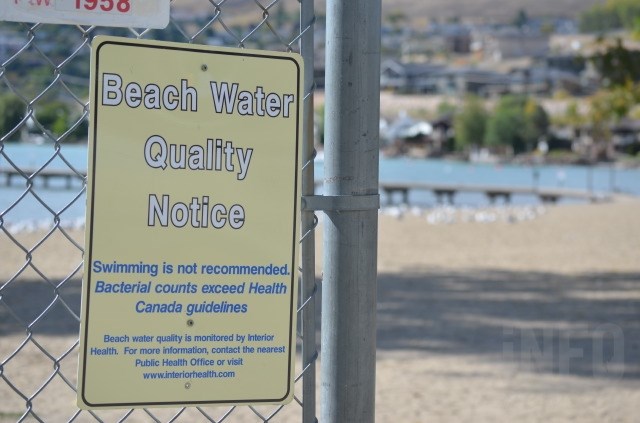
This advisory posted at Kal Beach in Vernon recommends people do not swim in the lake due to high bacteria levels.
(CHARLOTTE HELSTON / iNFOnews.ca)
September 16, 2015 - 1:43 PM
VERNON - That last swim of the summer might not feel so refreshing after you read this.
An advisory is in effect recommending people not go swimming at Kal Beach due to high counts of E. coli in the water.
Jennifer Jacobsen, a team leader for environmental health with the Interior Health Authority, says the advisory was issued the first week of September when a series of samplings showed above average levels of bacteria. However, it’s not considered unusual, especially at this time of year.
“Geese are congregating and that can really throw off the numbers,” Jacobsen says.
Another factor could likely be heavy wind and rainfall washing bacteria from the beach into the water, she says.
The sampling for E. coli isn’t species specific, so it’s unknown if the bacteria is pathogenic to humans. Even if it was, Jacobsen says someone would have to ingest it to get sick — primarily a concern for young children gulping water, not adults who can remember to keep their mouths shut.
“The reality is not a lot of people are using the beach so the risk to the public is quite low,” Jacobsen says.
Swimming is not prohibited, and anyone can use the beach at their own risk.
“We’re just letting people know there’s an elevated risk. They can make their own educated decisions,” Jacobsen says.
Bacteria counts crept up at a number of other beaches across the Okanagan in early September as well. Kin Beach in Vernon, Reiswig Regional Park in Lake Country, Rotary Beach in Oliver, and Okanagan Lake Beach in Penticton are listed as moderate, which means swimming is still considered safe, as of the last sampling taken on Sept. 11.
The North Okanagan Regional District and Interior Health will be reviewing new samples at Kal Beach this week and determining if the advisory needs to be kept in effect.
In general, Jacobsen says Okanagan beaches are clean and safe for swimming.
“We’ll see fluctuations with high turbidity, a rain event, or large flocks of geese, but we don’t see consistently high results. We’re very lucky, the beaches in the Okanagan are very safe,” she says.
To contact the reporter for this story, email Charlotte Helston at chelston@infonews.ca or call 250-309-5230. To contact the editor, email mjones@infonews.ca or call 250-718-2724.
News from © iNFOnews, 2015